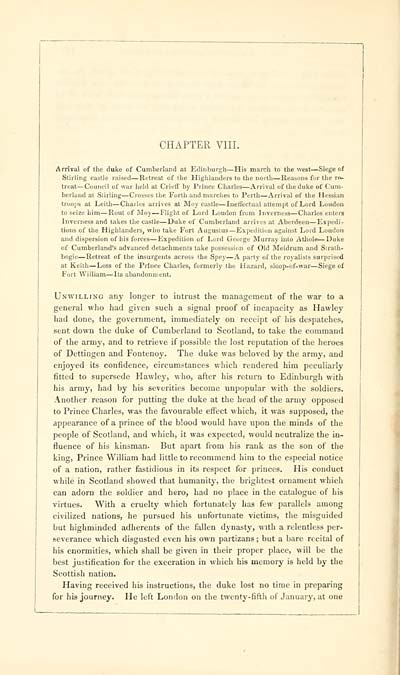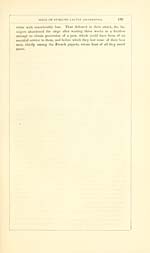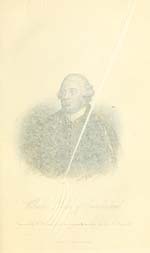Download files
Complete book:
Individual page:
Thumbnail gallery: Grid view | List view

CHAPTER VIII.
Arrival of the duke of Cumberland at Edinburgh — His march to the west — Siege of
Stirling castle raised — Retreat of the Highlanders to the north — Reasons fur the r«*-
treat — Council of war held at Crieff by Prince Charles — Arrival of the dulse of Cum-
berland at Stirling — Ciosses the Forth and marclies to Perth — Arrival of the Hessiim
troops at Leith — Charles arrives at Bloy castle — InetTectual attempt of Lord Loudon
to seize him — Rout of Mo) — Flight of Lord Loudon from Inverness — Charles entei's
Inverness and takes the castle — Duke of Cumberland arrives at Aberdeen — Expedi-
tions of the Highlanders, who take Fort Augustus — Expedition against Lord Loudon
and dispersion of his forces — Expedition of Lord George Murray into Athole — Duke
of Cumberland's advanced detachments take possessiun of Old Meldrum and Strath-
bogie — Retreat of the insurgents across the Spey — A party of the roj'alists surprised
at Keith — Loss of the Prince Charles, formerly the Hazard, sloop-of-war — Siege of
Fort William — Its abandonment.
Unwilling any longer to intrust the management of the war to a
general who had given such a signal proof of incapacity as Hawley
had done, the government, immediately on receipt of his despatches,
sent down the duke of Cumberland to Scotland, to take the command
of the army, and to retrieve if possible the lost reputation of the heroes
of Dettingcn and Fontenoy. The duke was beloved by the army, and
enjoyed its confidence, circumstances which rendered him peculiarly
fitted to supersede Hawley, who, after his return to Edinburgh with
his army, had by his severities become unpopular with the soldiers.
Another reason for putting the duke at the head of the army opposed
to Prince Charles, was the favourable effect which, it was supposed, the
appearance of a prince of the blood would have upon the minds of the
people of Scotland, and which, it was expected, would neutralize the in-
fluence of his kinsman. But apart from his rank as the son of the
king. Prince William had little to recommend him to the especial notice
of a nation, rather fastidious in its respect for princes. His conduct
while in Scotland showed that humanity, the brightest ornament which
can adorn the soldier and hero, had no place in the catalogue of his
virtues. With a cruelty which fortunately has few parallels among
civilized nations, he pursued his unfortunate victims, the misguided
but highniinded adherents of tlie fidlen dynasty, with a relentless per-
severance which disgusted even his own partizans ; but a bare recital of
his enormities, which shall be given in their proper place, will be the
best justification for the execration in which his memory is held by the
Scottish nation.
Having received his instructions, tlie duke lost no time in preparing
for his journey. He left Lonilon on the twenty-fiftli of January, at one
Arrival of the duke of Cumberland at Edinburgh — His march to the west — Siege of
Stirling castle raised — Retreat of the Highlanders to the north — Reasons fur the r«*-
treat — Council of war held at Crieff by Prince Charles — Arrival of the dulse of Cum-
berland at Stirling — Ciosses the Forth and marclies to Perth — Arrival of the Hessiim
troops at Leith — Charles arrives at Bloy castle — InetTectual attempt of Lord Loudon
to seize him — Rout of Mo) — Flight of Lord Loudon from Inverness — Charles entei's
Inverness and takes the castle — Duke of Cumberland arrives at Aberdeen — Expedi-
tions of the Highlanders, who take Fort Augustus — Expedition against Lord Loudon
and dispersion of his forces — Expedition of Lord George Murray into Athole — Duke
of Cumberland's advanced detachments take possessiun of Old Meldrum and Strath-
bogie — Retreat of the insurgents across the Spey — A party of the roj'alists surprised
at Keith — Loss of the Prince Charles, formerly the Hazard, sloop-of-war — Siege of
Fort William — Its abandonment.
Unwilling any longer to intrust the management of the war to a
general who had given such a signal proof of incapacity as Hawley
had done, the government, immediately on receipt of his despatches,
sent down the duke of Cumberland to Scotland, to take the command
of the army, and to retrieve if possible the lost reputation of the heroes
of Dettingcn and Fontenoy. The duke was beloved by the army, and
enjoyed its confidence, circumstances which rendered him peculiarly
fitted to supersede Hawley, who, after his return to Edinburgh with
his army, had by his severities become unpopular with the soldiers.
Another reason for putting the duke at the head of the army opposed
to Prince Charles, was the favourable effect which, it was supposed, the
appearance of a prince of the blood would have upon the minds of the
people of Scotland, and which, it was expected, would neutralize the in-
fluence of his kinsman. But apart from his rank as the son of the
king. Prince William had little to recommend him to the especial notice
of a nation, rather fastidious in its respect for princes. His conduct
while in Scotland showed that humanity, the brightest ornament which
can adorn the soldier and hero, had no place in the catalogue of his
virtues. With a cruelty which fortunately has few parallels among
civilized nations, he pursued his unfortunate victims, the misguided
but highniinded adherents of tlie fidlen dynasty, with a relentless per-
severance which disgusted even his own partizans ; but a bare recital of
his enormities, which shall be given in their proper place, will be the
best justification for the execration in which his memory is held by the
Scottish nation.
Having received his instructions, tlie duke lost no time in preparing
for his journey. He left Lonilon on the twenty-fiftli of January, at one
Set display mode to: Large image | Transcription
Images and transcriptions on this page, including medium image downloads, may be used under the Creative Commons Attribution 4.0 International Licence unless otherwise stated. ![]()
| Early Gaelic Book Collections > Ossian Collection > History of the Highlands and of the Highland clans > Volume 3 > (230) |
|---|
| Permanent URL | https://digital.nls.uk/79655182 |
|---|
| Description | Vol. III. |
|---|---|
| Shelfmark | Oss.249 |
| Attribution and copyright: |
|
| Description | Selected books from the Ossian Collection of 327 volumes, originally assembled by J. Norman Methven of Perth. Different editions and translations of James MacPherson's epic poem 'Ossian', some with a map of the 'Kingdom of Connor'. Also secondary material relating to Ossianic poetry and the Ossian controversy. |
|---|
| Description | Selected items from five 'Special and Named Printed Collections'. Includes books in Gaelic and other Celtic languages, works about the Gaels, their languages, literature, culture and history. |
|---|

